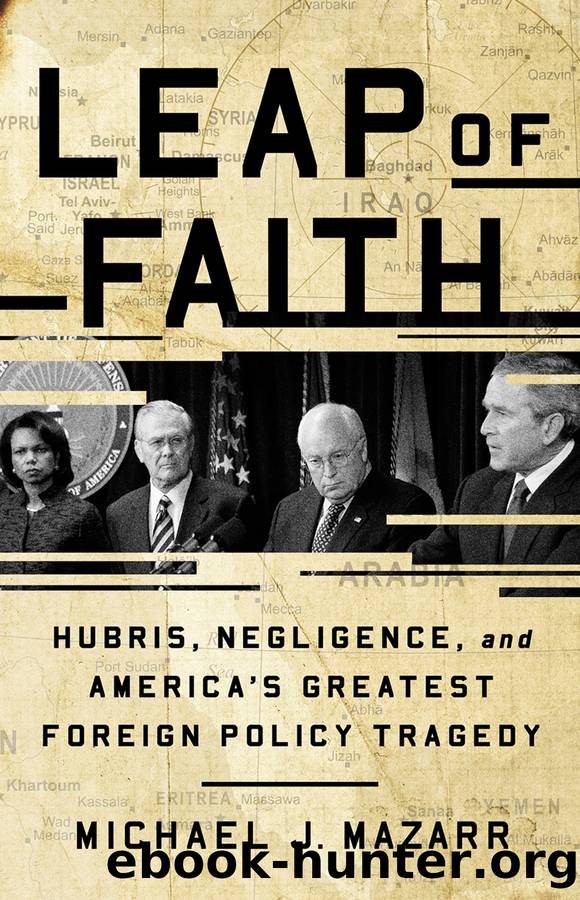Leap of Faith by Michael J. Mazarr

Author:Michael J. Mazarr [MAZARR, MICHAEL J.]
Language: eng
Format: epub
Publisher: PublicAffairs
Published: 2019-02-26T00:00:00+00:00
“So here’s the irony,” one former senior official explained. Donald Rumsfeld came into office after “watching the whole Bosnia thing unfold” and was determined not to make a similar mistake. Meanwhile, he had been questioning why US forces remained stuck in deployments that to his mind weren’t justified—in Europe, Greenland, and Korea. So the “animating idea of postwar Iraq was not to stay long. The last thing he would have wanted is an occupation.” He was, famously, given to tough questioning of loose assertions, and had, it was widely thought, one of the most incisive minds in government. How, then, did he preside over such a poor process that led to exactly what he wanted to avoid?
This official shook his head ruefully and sighed. “I haven’t been able to explain it since it happened.” The best reason he could come up with was that “he thought the postwar thing was being handled,” and he was “focused on winning the war.”118
Several sources with knowledge of Rumsfeld’s thinking suggest that he was not simple-minded enough to believe that US forces could be expected to be out within a couple of months.119 Rumsfeld did not speak, or perhaps even think, in such absolutes. But again: if not, why give so little attention to what would happen once they were there?
I asked another former senior official intimately involved in war planning: How could you plan to be there for so short a time, and still imagine you would stabilize the country? His face screwed up into a dismissive sneer, and he said, “We did not sit around predicting—pretending we knew—how long our forces would be in Iraq doing what. People don’t understand the difference between planning and predicting. The idea that we are crystal ball readers is stupid.”120 Which is of course beside the point—the issue wasn’t predicting; it was deciding on a firm, coherent concept for what the United States intended to do. But such a concept never really congealed out of the oozing muck that was the interagency debate about postwar governance.
Those who pointed out these shortcomings were subdued or bypassed. Another senior official closely involved in the planning said he saw briefings that proposed to cut US force levels down under sixty thousand by September 2003. He says he thought the assumption was crazy, and objected to it. His objection was dismissed, and so he concluded that, because the truth would only emerge with events anyway, the only thing to do was register his views and move on.121 There is, of course, the other possible reason why such objections had no meaningful effect: the possibility that Rumsfeld fully appreciated the risks of chaos but fully expected that the United States would be able to off-load them onto the Iraqis themselves.
Download
This site does not store any files on its server. We only index and link to content provided by other sites. Please contact the content providers to delete copyright contents if any and email us, we'll remove relevant links or contents immediately.
| Arms Control | Diplomacy |
| Security | Trades & Tariffs |
| Treaties | African |
| Asian | Australian & Oceanian |
| Canadian | Caribbean & Latin American |
| European | Middle Eastern |
| Russian & Former Soviet Union |
The Secret History by Donna Tartt(16626)
The Social Justice Warrior Handbook by Lisa De Pasquale(11489)
Thirteen Reasons Why by Jay Asher(7788)
This Is How You Lose Her by Junot Diaz(5774)
Weapons of Math Destruction by Cathy O'Neil(5037)
Zero to One by Peter Thiel(4824)
The Myth of the Strong Leader by Archie Brown(4789)
Promise Me, Dad by Joe Biden(4449)
Beartown by Fredrik Backman(4419)
Stone's Rules by Roger Stone(4416)
How Democracies Die by Steven Levitsky & Daniel Ziblatt(4399)
The Fire Next Time by James Baldwin(4343)
100 Deadly Skills by Clint Emerson(4079)
A Higher Loyalty: Truth, Lies, and Leadership by James Comey(4033)
Rise and Kill First by Ronen Bergman(4012)
The David Icke Guide to the Global Conspiracy (and how to end it) by David Icke(3883)
The Farm by Tom Rob Smith(3872)
Secrecy World by Jake Bernstein(3783)
The Doomsday Machine by Daniel Ellsberg(3731)
